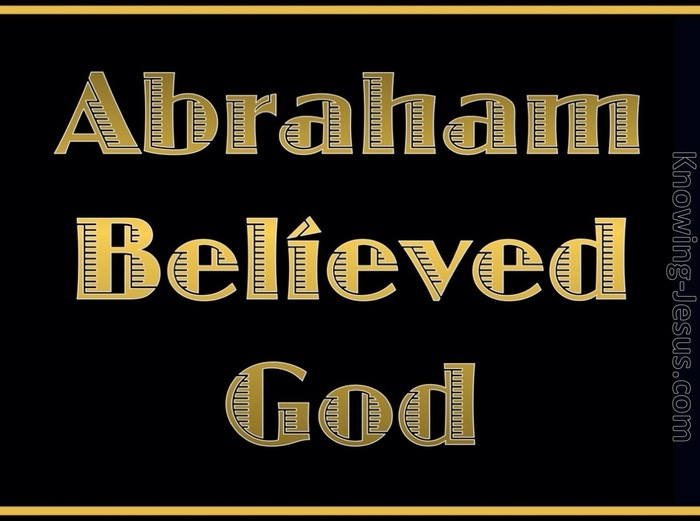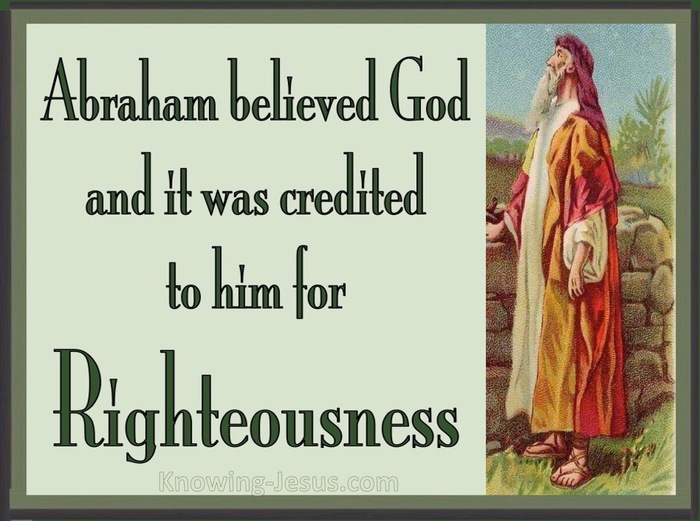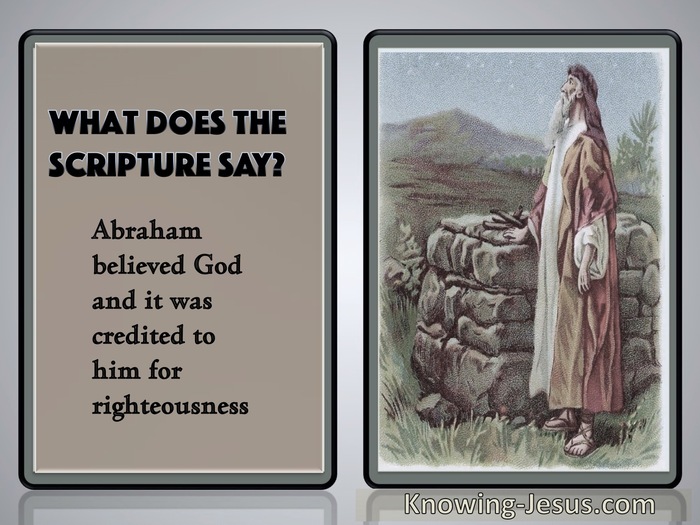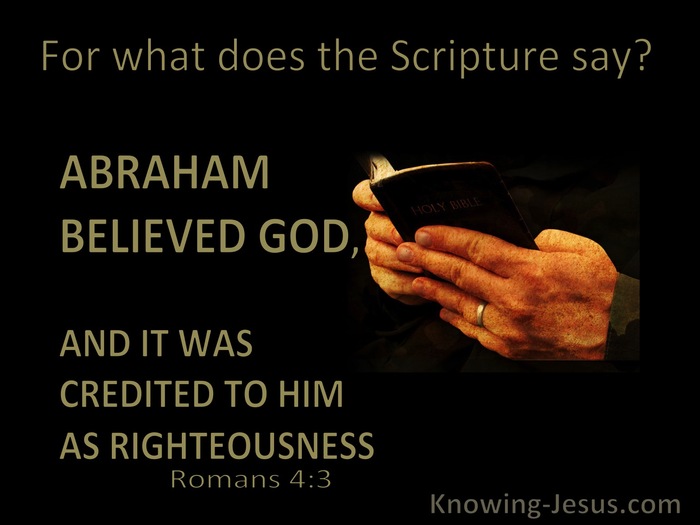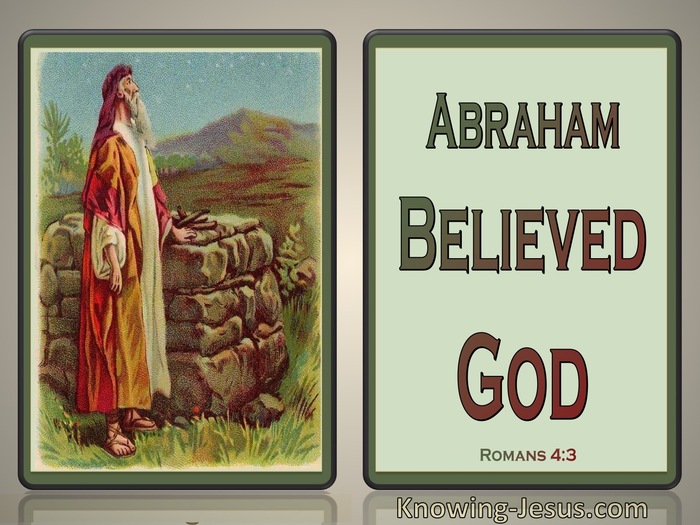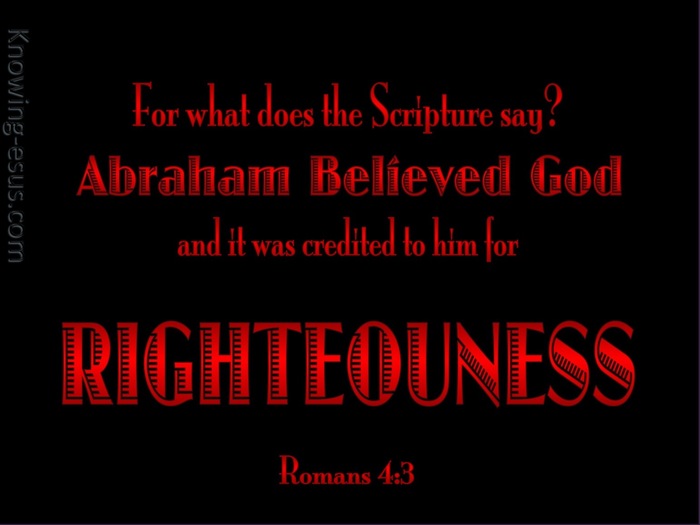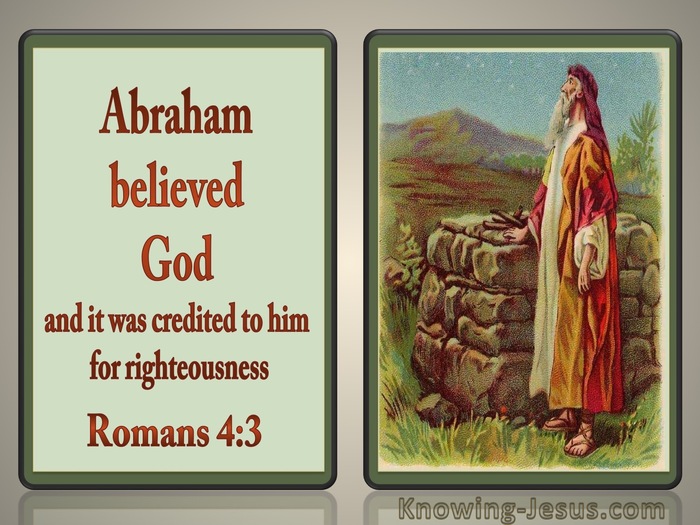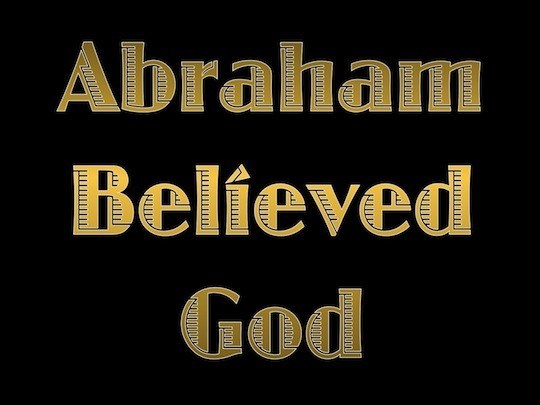Parallel Verses
Daniel Mace New Testament
for what saith the scripture? "Abraham believed God, and it was counted to him for righteousness."
New American Standard Bible
For what does the Scripture say? “
King James Version
For what saith the scripture? Abraham believed God, and it was counted unto him for righteousness.
Holman Bible
For what does the Scripture say?
and it was credited to him for righteousness.
International Standard Version
For what does the Scripture say? "Abraham believed God, and it was credited to him as righteousness."
A Conservative Version
For what does the scripture say? And Abraham believed God, and it was reckoned to him for righteousness.
American Standard Version
For what saith the scripture? And Abraham believed God, and it was reckoned unto him for righteousness.
Amplified
For what does the Scripture say? “Abraham believed in (trusted, relied on) God, and it was credited to his account as righteousness (right living, right standing with God).”
An Understandable Version
For what does the Scripture say? [Gen. 15:6 says], "And Abraham believed God, so God considered him righteous."
Anderson New Testament
For what says the scripture? Abraham believed God, and it was counted to him for righteousness.
Bible in Basic English
But what does it say in the holy Writings? And Abraham had faith in God, and it was put to his account as righteousness.
Common New Testament
For what does the scripture say? "Abraham believed God, and it was reckoned to him as righteousness."
Darby Translation
for what does the scripture say? And Abraham believed God, and it was reckoned to him as righteousness.
Godbey New Testament
For what does the scripture say? Abraham believed God, and it was imputed unto him for righteousness.
Goodspeed New Testament
for what does the Scripture say? "Abraham had faith in God, and it was credited to him as uprightness."
John Wesley New Testament
For what saith the scripture? Abraham believed God, and it was imputed to him for righteousness.
Julia Smith Translation
For what says the writing? And Abraham believed God, and it was reckoned to him for justice.
King James 2000
For what says the scripture? Abraham believed God, and it was counted unto him for righteousness.
Lexham Expanded Bible
For what does the scripture say? "And Abraham believed God, and it was credited to him for righteousness."
Modern King James verseion
For what does the Scripture say? "Abraham believed God, and it was counted to him for righteousness."
Modern Spelling Tyndale-Coverdale
For what saith the scripture? "Abraham believed God, and it was counted unto him for righteousness."
Moffatt New Testament
For what does scripture say? Abraham believed God and this was counted to him as righteousness.
Montgomery New Testament
For what does Scripture say? And Abraham believed God, and it was set down to his account as righteousness.
NET Bible
For what does the scripture say? "Abraham believed God, and it was credited to him as righteousness."
New Heart English Bible
For what does the Scripture say? "And Abraham believed God, and it was credited to him as righteousness."
Noyes New Testament
For what saith the scripture? "Abraham had faith in God, and it was accounted unto him as righteousness."
Sawyer New Testament
For what says the Scripture? And Abraham believed God and it was accounted to him for righteousness.
The Emphasized Bible
For what doth the Scripture say? And Abraham believed in God, and it was reckoned unto him as righteousness.
Thomas Haweis New Testament
For what doth the scripture say? Abraham truly believed God, and it was imputed to him for righteousness.
Twentieth Century New Testament
For what are the words of Scripture? 'Abraham had faith in God, and his faith was regarded by God as righteousness.'
Webster
For what saith the scripture? Abraham believed God, and it was counted to him for righteousness.
Weymouth New Testament
For what says the Scripture? "And Abraham believed God, and this was placed to his credit as righteousness."
Williams New Testament
For what does the Scripture say? "Abraham put his faith in God, and it was credited to him as right standing with God."
World English Bible
For what does the Scripture say? "Abraham believed God, and it was accounted to him for righteousness."
Worrell New Testament
For what does the Scripture say? "And Abraham believed God, and it was reckoned to him for righteousness."
Worsley New Testament
for what saith the scripture? "Abraham believed God, and it was counted to him for righteousness."
Youngs Literal Translation
for what doth the writing say? 'And Abraham did believe God, and it was reckoned to him -- to righteousness;'
Topics
Interlinear
Pisteuo
Logizomai
Devotionals
Devotionals about Romans 4:3
Devotionals containing Romans 4:3
References
Morish
Word Count of 37 Translations in Romans 4:3
Prayers for Romans 4:3
Questions on Romans 4:3
Verse Info
Context Readings
Abraham's Faith Counted As Righteousness
2 for if Abraham was justified by works, he had matter of pretension, whereas he had no such claim from God. 3 for what saith the scripture? "Abraham believed God, and it was counted to him for righteousness." 4 the reward is not counted as a favour to him that has done good actions, but as a debt:
Phrases
Names
Cross References
Romans 4:9
Is this happiness then for the circumcised only, or for the uncircumcised also? for we say that faith was accounted to Abraham for righteousness.
James 2:23
it was then, that those words of scripture were accomplished, "Abraham believed God, and he was regarded for it as a man of virtue, and was the favourite of God."
Romans 4:5
whereas he that trusts in God to be made righteous, tho' he has not done such actions, shall find his faith accounted as righteousness.
Mark 12:10
have you not read, said he, this passage of scripture, "the stone which the builders rejected, is become the principal stone of the angle.
Romans 4:11
and he received the sign of circumcision, as a seal of the justification by that faith, which the uncircumcised have: that he might be the father of all those who believe, tho' they are uncircumcised, that it might be accounted to them also for righteousness:
Romans 4:22-25
and therefore it was accounted to him for righteousness.
Romans 9:17
for 'tis said in scripture to Pharaoh, "even for this same purpose have I raised thee up, that I might shew my power in thee, and that my name might be declared throughout all the earth."
Romans 10:11
for the scripture saith, "whosoever believeth on him, shall not be ashamed."
Romans 11:2
God hath not discarded his people whom he formerly approv'd. don't you know what the scripture says of Elias? how he complain'd to God against Israel,
Galatians 3:6-8
As Abraham believed God, and it was accounted to him for righteousness:
James 4:5
or do you imagine that passage of scripture to be insignificant, "does the spirit that dwells in you, incite you to vice?"
2 Peter 1:20-21
But you must above all consider, that no prophecy of the scripture did proceed
